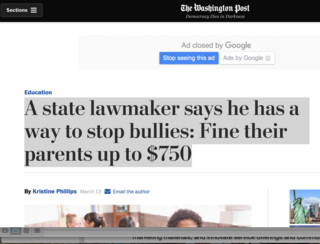Bullying
Why Fining Parents for Bullying Will Intensify Hostilities
Legislator's proposal to retrain and punish parents of bullies will backfire.
Posted March 22, 2018

Lawmakers are desperately seeking ways to make schools safe from bullying. In less than one month — April 20 — we will be commemorating the 19th anniversary of the Columbine massacre, the incident that ignited the worldwide anti-bullying crusade. Despite thousands of research studies on bullying and on bullying prevention programs, bullying is proving to be a stubborn epidemic.
The recent horrific school massacre in Parkland, Florida, committed by a disturbed student who, among other problems, was a victim of bullying, has sent the country into even higher gear to find a solution.
One such effort that has been making national headlines is a bill, proposed by Pennsylvania State Rep. Frank Burns, that will punish parents with fines of up to $750 if their children don’t stop engaging in bullying.
These are some of the proposals of the bill, according to the Washington Post:1
If a child bullies for the first time, school officials would have to take some type of action, according to Burns’s office. Parents would have to take parenting classes on bullying after a second incident. If a child keeps bullying, a judge will determine whether there’s enough evidence to fine the parents and issue a court order forcing them to pay $500.
If bullying continues after the third incident, parents will be fined $750 for each offense thereafter, Burns said.
“Parental accountability is a big factor in bullying,” Burns said. “A lot of parents refuse to believe that their son or daughter is bullying people. They want to believe that their kid is great and would not do such a thing.”
Like so many other well-intentioned anti-bullying initiatives, this one is bound to cause more harm than good, resulting in intensified hostilities. That’s because the more intensively we fight bullying, the more intense the bullying problem becomes.
The leaders of the anti-bullying movement have been blaming schools for the bullying among students. School anti-bullying laws have been passed in every state that make it easier for parents to sue schools for failing to stop their children from being bullied.
These laws haven’t succeeded in solving the bullying problem. While school administrators had been as enthusiastic as everyone else about the introduction of anti-bullying laws, expecting that the laws will “give them teeth” to put an end to bullying, they have discovered that the laws’ teeth are digging into them instead. The administrators are the ones ultimately prosecuted for the failure of the laws to solve a problem they didn’t cause, and that the leading bullying experts don’t know how to solve.
But someone must be blamed. So the next logical move is for school administrators to blame the parents. After all, parents create and raise their children, and therefore must be responsible if they grow up “bad.” The logical thing, then, is to send the parents of bullies to parent training, and if they fail to reform their evil children, they will be punished with hefty fines. So they had better take the parent training seriously!
Brilliant, right?
This is what will happen. Some bullying relationships will be put to a stop, because some kids, when confronted with bad behavior, will stop it, either because they don’t want to get in trouble and/or they weren’t strongly invested in that behavior. This will happen whether or not the parents are threatened with retraining and punishment.
But what will happen in the remainder of bullying situations that aren't resolved smoothly? The results will not be neutral. The hostilities will intensify, as usual. That’s why in almost every news story about a bullying situation that led to serious violence, the violence occurred after the school got involved in trying to make it stop. Because once the school authorities begin their mandated duties of investigating, interrogating, judging, punishing, and filing reports with the district, each child and their parents get busy defending themselves and blaming the other side. The complainer gets known as a snitch, and then matters get really bad for them.
But won’t parent training and threats of fines make things better?
Think of it this way. Let’s say a police officer pulls you over on the highway and accuses you of speeding. When will you fight the charge more intensively — if the officer reprimands you and warns you not to speed again, or if he writes you a summons requiring you to go for a series of driving classes and pay a hefty fine?
Well, it's no different when school authorities demand that the parents go for parent-training classes with a threat of a hefty fine, because their child is accused of bullying.
The parents will confront their child, “Look, Billy, we really love you, but the school says you are bullying Johnny, and now we have to go for parenting classes. So you had better apologize to Johnny and be nice to him from now on, or we’re going to have to pay a huge fine!”
Is Billy more likely to respond with A or B?
A: “Oh, really, Mommy and Daddy? Do I have to stop? Because I really enjoy making Johnny suffer. I hate to have to give it up. But I guess I don’t want you to have to pay a big fine on my account, so I’ll stop bullying him.”
B: “What are you talking about?! I’m not bullying Johnny! He’s always starting up with me, and then when I try to stop him, he tells the teacher on me! And the teacher always believes him! It’s not fair!”
In the highly unlikely instance that the alleged bully, Billy, goes the A route — great! The problem is over. If he goes the B route, are his parents more likely to tell the school authorities A or B?
A: “We're really glad that the school is offering us parent-training classes, because we really need them. We messed up as parents and raised a mean, unrepentant bully. We’re going to take the parenting classes real serious, and if we still fail to get Billy to stop bullying Johnny, we will gratefully pay $500 or $750, because we are failures as parents and deserve to be punished. Then we’ll beat the crap out of Billy for making us pay so much money, and then he will be too scared to ever bully anyone again!”
B: “How dare you accuse us! We are good parents, and Billy would never bully anyone! We spoke to him, and he insists that Johnny is always the instigator, and you always believe Johnny! You should send Johnny’s parents to training classes, not us! Make them pay a fine for raising a scoundrel!”
In the immensely unlikely chance that Billy's parents go the A route, fine. The problem may be over. If they go the B route, will the school authorities do A or B?
A: Tell Johnny's parents, “Listen, Billy insists that your son, Johnny, is the real bully. Therefore we are sending you to parent-training classes, and you will face a big fine if you don’t stop him from starting up with Billy.”
B: Tell Billy's parents, “Stop defending your son! If we tell you Billy is bullying Johnny, and you defend Billy, you are no better than he is! You really need those parenting classes, because now it’s obvious who taught Billy to be a bully. And you had better make the parent training work, or you’re going to be paying a lot of money!”
Either choice will now lead to disaster. The school administration is between a rock and a hard place, and will need the wisdom of Solomon to defuse the situation. And if the administrators fail, they may be facing a lawsuit by either Johnny’s or Billy’s parents.
So, yes, some bullying will be stopped by holding parents responsible. But in the rest of the cases, everyone will become angrier at each other.
Why don’t intelligent people understand this? It’s because everyone thinks it’s a great idea to be tough on bullying, and everyone thinks the other person or their child is the bully. It’s only when they or their children get accused of being bullies that they are no longer enthusiastic with the “get tough on bullying” schemes.
We can excuse the ordinary population for supporting these ideas. The anti-bullying movement was created and has been fostered by academic psychological researchers, and people have faith in scientific researchers. But what excuse do the academic researchers have for promoting a simplistic, legalistic paradigm of social strife as the product of guilty bullies and blameless victims, and for insisting that we can create positive school environments by treating bullies and their parents like criminals that need to be punished and/or rehabilitated?
Let us conclude with another bullying story that has just made headlines throughout the nation. As the Houston Chron reports2,
A Katy man [Greg Gay] who said he was regularly bullied as a boy accused Katy ISD Superintendent Lance Hindt at a public meeting this week of being one of his leading tormentors more than three decades ago… In one incident, Barrett — he now uses his mother's maiden name — said his lip was cut when his head was shoved into a urinal in the boys' bathroom at school… "Lance, you were the one that shoved my head in the urinal," he told the 53-year-old educator.
The article also informs us that Superintendent Hindt said:
I am proud to lead a district that is not afraid to confront bullying behavior — whether in person or online. We are always challenging our teachers and principals to identify harmful behavior and to intervene as necessary.
Of course, the superintendent, who is a mature education leader committed to ending bullying in school, did the right thing, apologizing profusely and offering to make amends to his childhood victim, right?
As the Chron quotes:
"As superintendent in three school districts in Texas, I have always tried to create an environment where every student is safe — physically and emotionally. But when an individual impugns my character and reputation as the instigator of those actions, I am disappointed because it simply is not true," said Hindt, who previously led the Allen ISD for two years and the Stafford Municipal School District for three years.
Superintendent Hindt’s behavior is not abnormal. He did what human nature drives us to do: defend ourselves when accused of wrongdoing. So if even school superintendents dedicated to student safety vehemently deny bullying accusations against themselves, should we expect ordinary students and their parents to be any more noble?
References
1. A state lawmaker says he has a way to stop bullies: Fine their parents up to $750 https://www.washingtonpost.com/news/education/wp/2018/03/13/a-state-law…
2. Man levels three-decades-old bullying charge against Katy ISD's superintendent at public session https://www.chron.com/neighborhood/katy-news/article/Katy-ISD-superinte…




